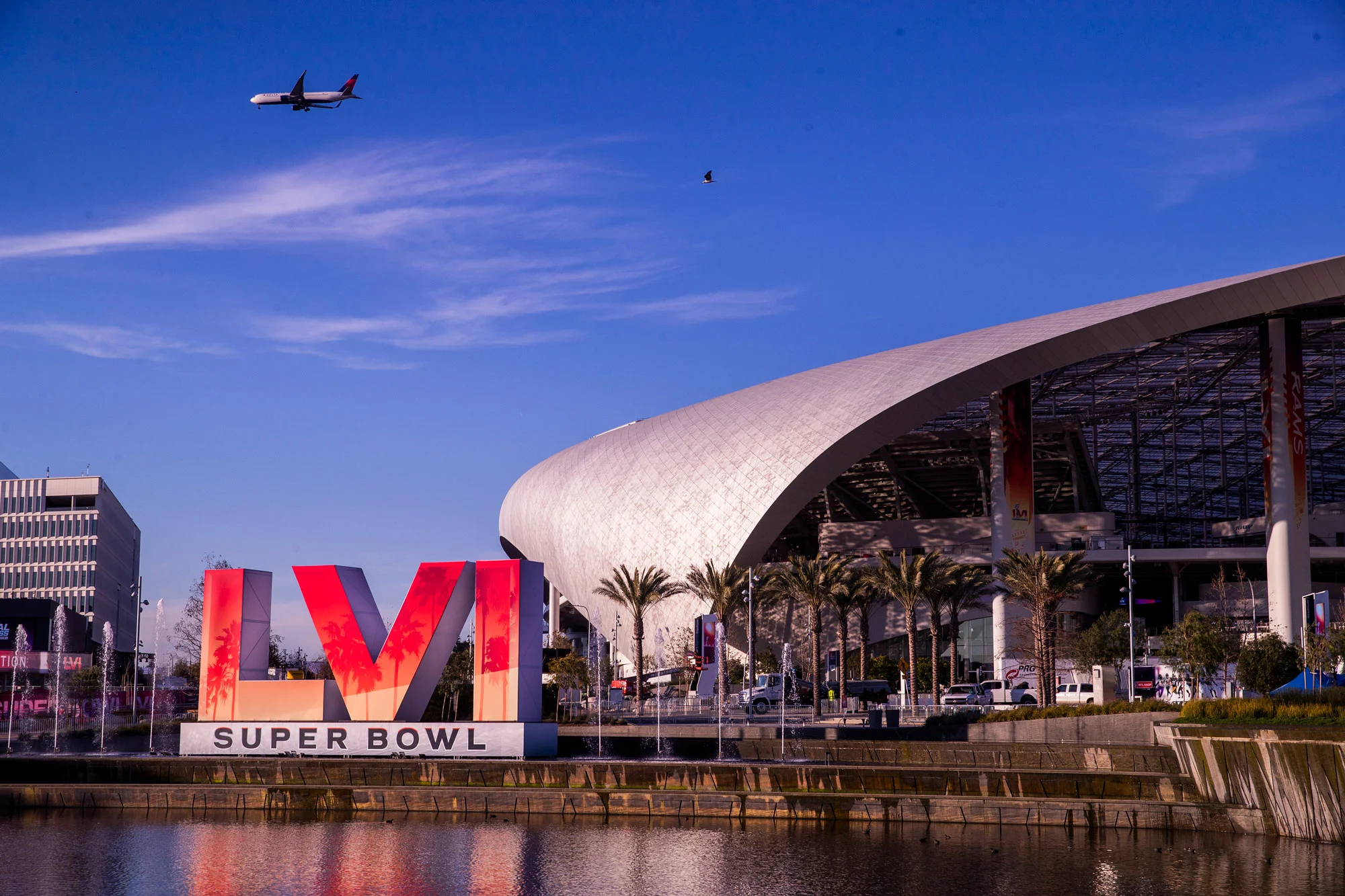Expect SoFi Stadium to be a regular Super Bowl host

New Orleans and Miami have become almost synonymous with the Super Bowl over the years. And now that SoFi Stadium in Inglewood is ready to host the big game, the Los Angeles region may finally re-join the ranks of the country’s elite football cities.
Half of the 56 Super Bowl games have been played in just three metropolitan areas. Miami has hosted the most with 11 games, followed by New Orleans’ 10. The Los Angeles area’s total is third with seven — that is until the Cincinnati Bengals meet the Rams at SoFi Stadium on Sunday.
Super Bowl LVI marks the end of a 29-year Super Bowl drought in the region.
After the first Super Bowl was held at the Coliseum in 1967, Los Angeles hosted six more games through 1993, with all but one taking place at the Rose Bowl in Pasadena. In that period, Los Angeles tied with New Orleans for the record of most times hosting the competition, seven times each.
By the start of the 1995 season, both the Raiders and the Rams had left Los Angeles, rendering the city ineligible to host a Super Bowl. Because one less city was able to bid, teams in cities like Phoenix, Dallas and Indianapolis were able to host for the first time.
Super Bowl host cities since 1967
Hosted game

’70
’80
’90
’00
’10
’20
Miami (11)
New Orleans (10)
No NFL team
Los Angeles (8)
Tampa (5)
Phoenix (3)
San Diego (3)
Houston (3)
Atlanta (3)
Detroit (2)
San Francisco (2)
Minneapolis (2)
Jacksonville (1)
Dallas-Fort Worth (1)
Indianapolis (1)
New York (1)

’70
’80
’90
’00
’10
’20
Miami (11)
New Orleans (10)
No NFL team
Los Angeles (8)
Tampa (5)
Phoenix (3)
San Diego (3)
Houston (3)
Atlanta (3)
Detroit (2)
San Francisco (2)
Minneapolis (2)
Jacksonville (1)
Dallas-Ft. Worth (1)
Indianapolis (1)
New York (1)
Over the years, a clear geographic trend has emerged among the Super Bowl hosts: a warm February climate. This is not a coincidence. According to a leaked NFL document from 2013, host cities with an average temperature below 50 degrees were required to also have an enclosed stadium.
The one exception to this rule came in 2014 when Super Bowl XLVIII was played at MetLife Stadium in the New York metropolitan area. In that case, the league waived the stadium enclosure requirement to help the region recover after the 9/11 attacks.
Since 1967, 34 current and former cities have been home to an NFL team, but only 15 have hosted a Super Bowl.
Most Super Bowls take place in warmer areas

Super Bowl counts
Normal Feb. temperature (1991-2020)
11
3
10°
72°F
1

NFL cities that
have never hosted
a Super Bowl
Minneapolis
Detroit
New York
San Francisco
Indianapolis
Los Angeles
Atlanta
Phoenix
San Diego
Dallas
Jacksonville
New Orleans
Miami
Houston
Tampa

Super Bowl counts
Normal Feb. temperature (1991-2020)
11
3
10°
72°F
1

NFL cities that
have never hosted
a Super Bowl
Minneapolis
Detroit
New York
San Francisco
Indianapolis
Los
Angeles
Atlanta
Phoenix
Dallas
San Diego
Jacksonville
New Orleans
Houston
Tampa
Miami

Normal Feb. temperature (1991-2020)
10°
72°F
Super Bowl counts
NFL cities that
have never hosted
a Super Bowl
11
1
Minneapolis
Detroit
New York
San Francisco
Los
Angeles
Phoenix
Atlanta
San Diego
New Orleans
Houston
Tampa
Miami

Normal Feb. temperature (’91-’20)
10°
72°F
Super Bowl
counts
NFL cities that
have never hosted
a Super Bowl
11
1
Minneapolis
New
York
Los Angeles
New
Orleans
Miami
Los Angeles’s long absence from the NFL made it easier for team owners to request stadiums, especially costlier venues with roofs. Many owners hinted at moving to L.A., which resulted in a mass construction of stadiums over a 20-year period. Between 1995 and 2016, nearly two thirds of the league's 30 stadiums were built.
This made cold weather cities such as Minneapolis a more appealing destination for a Super Bowl. In 2012, Minnesota Vikings owner Zygi Wilf grew frustrated with the local government and sparked fears the team would move to Los Angeles. This uncertainty helped pass through the $1.1-billion fixed-roof U.S. Bank Stadium. The city went on to host only its second Super Bowl in 2018.
Two thirds of NFL stadiums were built in recent decades
Since 2017, the NFL has taken a new approach to finding a setting for its big game. Instead of accepting bids from local governments, the league will first invite a city to put on a future Super Bowl. The next three Super Bowls all happen to be in warm metro areas: Phoenix, Las Vegas and New Orleans.
Though the Super Bowl is now decided behind closed doors, Los Angeles could be a popular spot for the competition for years to come.
The city is already a regular site for other sports such as the NBA’s All-Star Game and the Summer X Games, and hosts major entertainment events including the Oscars and Emmys.
With SoFi Stadium and the adjacent YouTube Theater, local business leaders are hopeful the Inglewood venue will become a “mega sports and entertainment hub.” The complex is already slated to host the 2023 College Football Playoff National Championship Game, Los Angeles is among host cities for the 2026 Men’s World Cup in North America and will be home to the 2028 Olympic Games.